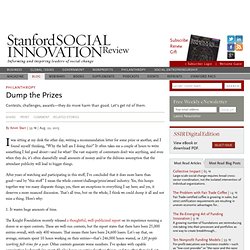

Dump the Prizes. I was sitting at my desk the other day, writing a recommendation letter for some prize or another, and I found myself thinking, “Why the hell am I doing this?”

It often takes me a couple of hours to write something I feel good about—and for what? The vast majority of contestants don’t win anything, and even when they do, it’s often shamefully small amounts of money and/or the dubious assumption that the attendant publicity will lead to bigger things. After years of watching and participating in this stuff, I’ve concluded that it does more harm than good—and by “this stuff” I mean the whole contest/challenge/prize/award industry. Yes, this lumps together way too many disparate things; yes, there are exceptions to everything I say here; and yes, it deserves a more nuanced discussion. That’s all true, but on the whole, I think we could dump it all and not miss a thing. 1. And it’s exploitive. 2. Ideas are easy; implementation is hard. 3. 4.
They give you $1.25 million. Just How Powerful Are You? - Nilofer Merchant. When you write online, no one checks to see if you have a journalism degree before they start to read.

If you experience an earthquake and want to report on its danger or safety, no one asks your credentials before you report to Ushahidi. And if you were interested a creating a new company, you can simply initiate the idea and get funding through Kickstarter or Indie GoGo. The gateways of power have changed.
Or have they? When I look around, I see a culture that honors being prepared, doing the right things to get ahead, and achieving more and more, starting with our education — we need to go to the right high school to get into the right college, to get the right job after college. So, which is it? I’d like to explore this topic with you by sharing two arguments about what defines power today. Argument 1: You Are Powerful Beyond Measure Academic degrees, once a status differentiator, are no longer required to create good ideas.
Argument 2: Power is a Limited Commodity. Why I Am Leaving Goldman Sachs. It makes me ill how callously people talk about ripping their clients off.

Over the last 12 months I have seen five different managing directors refer to their own clients as “muppets,” sometimes over internal e-mail. Even after the S.E.C., Fabulous Fab, Abacus, God’s work, Carl Levin, Vampire Squids? No humility? I mean, come on. Integrity? It astounds me how little senior management gets a basic truth: If clients don’t trust you they will eventually stop doing business with you. These days, the most common question I get from junior analysts about derivatives is, “How much money did we make off the client?” When I was a first-year analyst I didn’t know where the bathroom was, or how to tie my shoelaces.
I hope this can be a wake-up call to the board of directors. U.S. Op-Ed Contributor Published: March 14, 2012 372 Comments 372 Comments Readers shared their thoughts on this article. Newest Comments Closed Log in to discover more articles based on what you‘ve read. What’s This? David Damberger: What happens when an NGO admits failure.